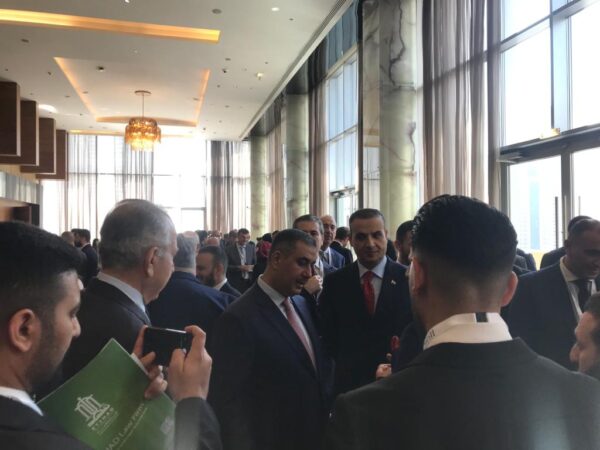IBBC’s Dubai conference doubles in scope and impact
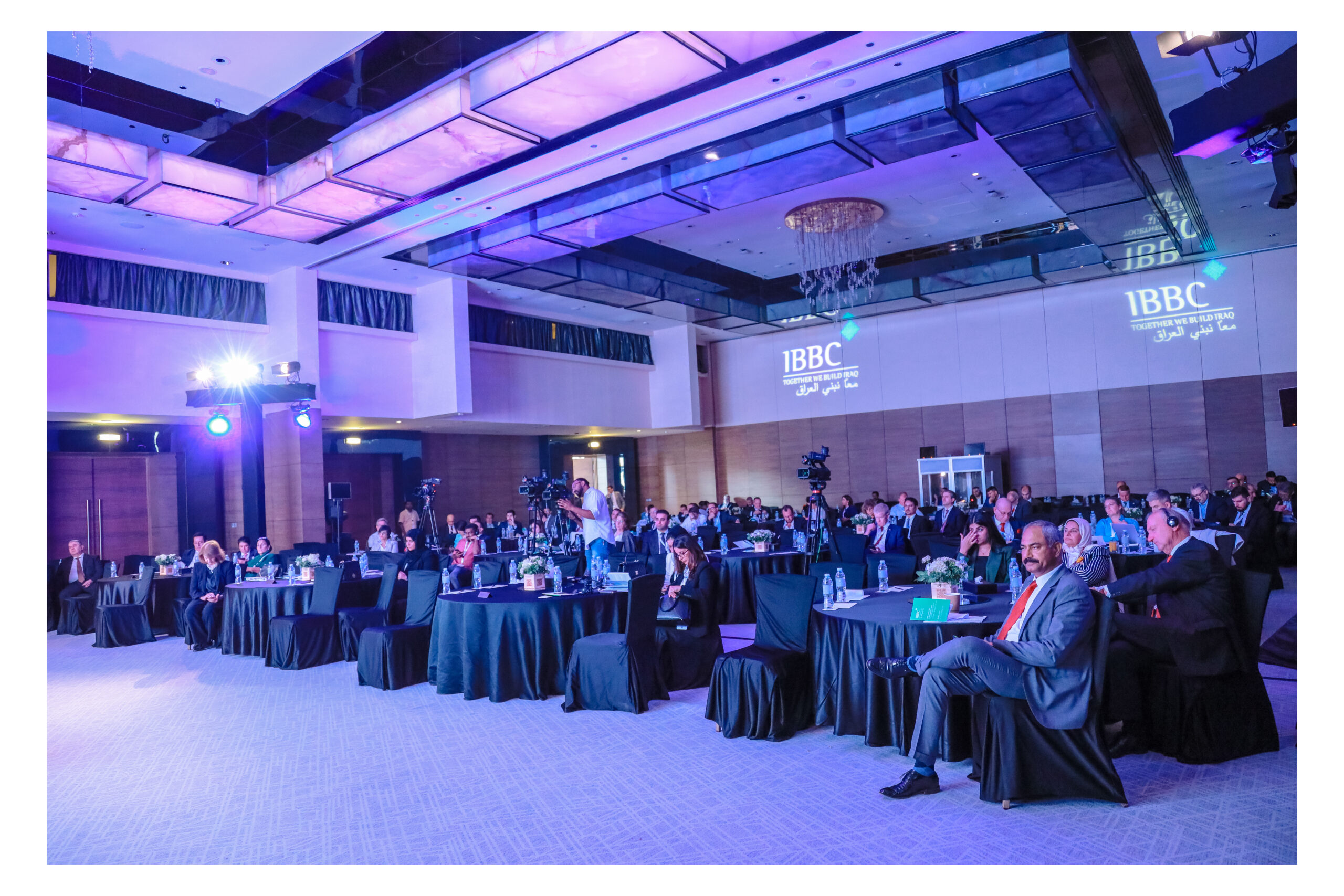
As Iraq returns to the international stage with record oil revenues, stability, and a new Government, the IBBC extended its Autumn Dubai conference over three days to accommodate a record number of attendees and speakers. While energy is fundamental to Iraq, the conference branched out to encompass other important topics, challenges, and opportunities that Iraq’s rebounding economy requires in the immediate and longer term.
Foremost sectors include finance and investment, tech, infrastructure and industry, water and the environment, education, skills and training and a special focus on regional areas including KRI and Basrah. Education was the subject of a special preconference day for universities and government officials.
Addressing and welcoming the business conference Baroness Nicholson, President of IBBC confirmed that Iraq is an important country for Britain, and we enjoy good and strong relations, especially between IBBC members from both the UK and Iraq. HE Juma Al Kait, Assistant Undersecretary for International Trade, UAE Ministry of Economy also welcomed the delegates to the UAE and noted that trade between Iraq and UAE has grown over 60% in the last year and is set to continue growing in the future.
HE Mr Mustafa Ghalid Mukheef, Governor of the Central Bank of Iraq, spoke of continued and accelerated investment in infrastructure, Mr Adel Khudair Al Masoodi, Representing the Iraqi Minister of Trade, The British Ambassador, Mr Mark Bryson- Richardson, Dr Mohammed Shukri Chairman of Kurdistan Investment board and Mr Sardar Al Bebany, Sardar group Chairman and CEO and principal sponsors of the conference all focused on different aspects of business and trade opportunities.
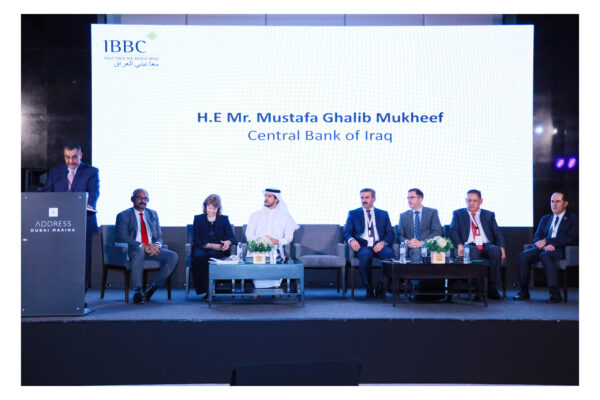
With a strong financial focus on day one, Mr Abdullah Jefri of International Finance corporation said that Iraq has an alarming economic reliance on oil and under threat from climate change, drought, and food security so the country will require $250bn of investment to diversify and meet demands for infrastructure and IFC are investing in Telecoms, Ports, infrastructure / renewables and agriculture with the private sector, which is the only way to reach the investment objectives. Dr Salem Chalabi, President and Chairman of Trade Bank of Iraq gave a keynote speech with the message that a concerted effort is required to convert the wealth beneath Iraq to provide prosperity for the poorest who live above it. In particular Iraq has 420,000 new people entering the workforce each year, who require employment. Dr Chalabi called for the private sector to be given the means to address the crucial employment and other challenges. TBI is investing in solar power, refinery production and assisting the central bank in numerous private sector projects.
As principal sponsors, Sardar Group held a keynote session outlining their plans for Iraq, including the opening of the largest car showroom in Iraq in Baghdad, the bourgeoning automotive market, and their dedication to training, developing, and investing in the professionalism of their employees. A notable initiative is Sardar’s commitment to training Yazidi IDP’s in KRI in business skills and English. But Sardar has also been on a long journey from a family business to a corporation and from car dealerships to the electrification of Iraq and the intention to set up electric trains, while extending nationally and internationally with international investors and capabilities from the USA, Japan, and the UK.
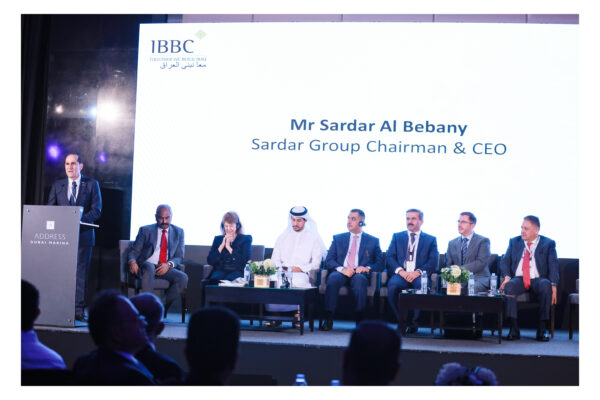
Finance also dominated the afternoon panels with Mr Mohammed Al Delaimy, CEO Standard chartered bank chairing the IFC, MFL Finance, IIB and Etihad Credit Insurance and Sardar group
The KRI brought a significant number of delegates, and a new panel focus of Business in Iraqi Kurdistan, chaired by Mr Aiz Khidairi, with Dr Shukri, Mr Edip Nezir of UB Holding who explained the significant expansion of the group into Skiing resorts in the Kurdish mountains, residential, hospitality and steel in Basra. Mr Sheikh Salih Al Barzinje of London Sky noted the growing IBBC membership and businesses in the region are keen to travel for business and pleasure. Mr Amanj Raheem, Cabinet Secretary of the Kurdistan Regional Government commented on improving relations between Baghdad and Erbil.
The tech forum speakers ranged from Padraig O Hannelly, Editor of Iraq Business news, gave an overarching summary of where tech has evolved in Iraq, followed by Laura Khudairi, of Iraq venture partners, who invest in start-ups and early-stage businesses, explained how the start up economy is fairing and the necessity of bringing in more secondary stage investors to help scale up the ecosystem. Hossam Darra COO of SAP ME gave a full account of how SAP is supporting digital literacy, sustainable business, and the importance of technology as the new infrastructure for all areas of the economy including education, agriculture, and finance and how Government can manage data and resources more efficiently. Shamal Mohammed of Silal then discussed with Ashley Goodall the IBBC tech chair, the options for water and agriculture improvement and management through technology. The potential for carbon credit investment into soil improvement, use and monitoring of water resources and the kind of agricultural systems that are already being deployed in the Gulf, the opportunity for a thriving agriculture sector is possible with the new technologies, carbon credits to upgrade and invest in agriculture and raised the idea of developing a green wall of trees and diverse plants to halt the desertification.
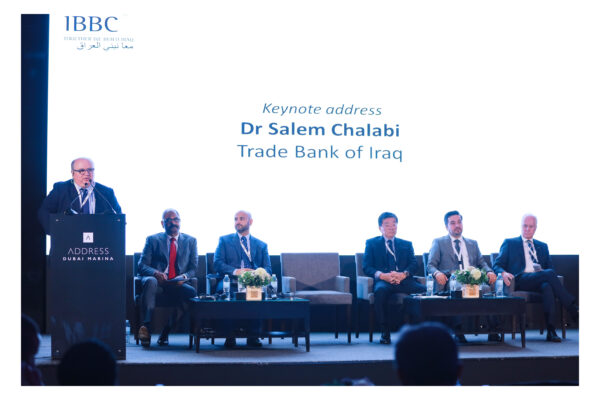
In the second part, the focus was on edutech and the way in which Stirling Education are using online teaching for both students and teachers, the kind of emergent courses available, and the collaboration with KRI education ministry to share online courses with public sector education.
The final panel included Industry members, chaired by Mr Aziz Khudairi, with Mr Adil Akah Al Shnawa, President of the Iraqi Federation of Industries, Mr Ahmed Abdulla Hadi Al Hankawi of Etihad law noted there are 5000 foreign companies in Iraq who all bring tax and income benefits to the economy, and called for more simplicity and encouragement for foreign investors to come to Iraq. Mr Amar Shubar of Management partners gave a strategic overview of Iraq’s lack of industrial competitiveness, including the key drivers of failure, and clarity on what can and needs to happen to restore the country’s capabilities. Ms Sura Khudairi of Khudairi Group who said the fashion market in Iraq is growing fast and there is a strong possibility of reinventing the local production of materials and design for Iraqis, and showcased her ‘Street turban’ look, that takes women beyond the religious control of the past. Mr Hardi Ismail of Mselect shared their latest learning and development survey that is the country’s first overview of this area, that enables people to make informed decisions about the level and type of training required by companies. Some of the data suggests 41% of companies see increased productivity because of training, 93% still prefer classroom training over online, but the global trend is very much about online training, and 37% of companies cite cost as a restriction to training and development, including oil and gas sectors. The survey will be done annually for comparison and to support Mselect’s training insights and business.
Baroness Nicholson, President of IBBC opened day three with a welcoming speech that covered business opportunities in Basrah including speeches from Deputy Governor of Basrah, Mr Mohammed Tahir Altamini, Mr Majid Mozan Gutami, Chairman of Basrah Chamber of commerce, Mr Raed Hanna, MFL Finance, and Ms Marlin Shabo of AAA holding. Mrs Sara Akbar of Oil Serv gave a keynote on collaboration with Kuwait and the combined opportunity with Basrah and the south, while Ms Kate Dourian of Iraq oil report said the GOI has $100bn revenues in 2022 and for the coming year, which should be invested in production and infrastructure.
Basrah is known for its energy production, so the energy panel big guns highlight included not only Iraq Oil report, OilServ but also Basrah Gas Company’s Mr Marfa al Asady , and Hans Hoiskar of Petronor. Dr Laith Abdulhussein Kadhim Al Shaher DG of the Legal Directorate at the Ministry of Oil said Iraq is rebuilding its oil infrastructure as its so important for GOI revenues and invited western energy companies to help build the infrastructure. The vision is for Iraq to increase production and activate exploration activities to increase hydrocarbon reserves. Iraq will increase refining capacity to reach self sufficiency in oil products and will increase gas capturing projects to eliminate gas flaring. Gas production is 3bn ‘scuff ‘50% is still flared 1.5bn captured, hence still importing gas from Iran for powerplants. Rehabilitation of infrastructure for export outlets ports and terminals, increasing storage capacity, and environmental protection all planned. Currently there are 4.4mbpd but there is long term demand as Iraq’s oil, and the fields are now 100-70 years old, so there’s a need to renew and pump to reservoirs and increase capacity. New refining capacity is adding 350k bpd in Karbala from next year.
Further plans include capture of 1.5 ‘scuff’ of gas and to plant more trees and forest on oil fields to reduce pollution as does reduction in gas flaring and reduce methane emission to locate areas of escape and take steps to reduce in the next year. Basra Gas Company’s Mr Marfa Al Asady said there has been x4 production increase since 2013 of gas capture and plans to increase to 1.4 scuff. The gas capture has also created 5000 direct jobs and a further 5,000 indirect jobs locally. Furthermore, BGC are also training local young people and women with Basra University to obtain certificates in welding, electronics, and other skills to enable them to apply and obtain jobs in the company. The Basra Uni project also helps local people more generally to get skill certificates for work, Sarah Akbar of Oilserve also observed that its not sensible to be importing gas from Iran while there is so much potential for gas capture in Iraq, and to stop pollution and greenhouse gas emissions, it should be the number one priority of Gov to stop gas flaring and for the private sector to deliver this if opened up to them. Lizzie Porter of Iraq Oil Report also observed that the Gov has $100bn of income that needs to be invested wisely in production and capabilities for a better environment and employment. A message echoed by Mr Hans Hoiskar of Petronor, who said business in Basrah is healthy but again investment in productivity and efficiency is important to regear the country.
Vikas Handa also noted and appealed to the Gov that cancer in Basrah or Iraq is a scourge both Vikas and Dr Laith lost close relatives to cancer, that is an issue in the region, so flaring and pollution must be reduced to stop this. Sara Akbar said that Basrah does not have a cancer centre for scans, so a great need for a cancer centre in Basrah is require and should be funded by oil companies.
Water and the Environment panel addressed World Food Programme, Hydro C (renewables) and Mr Mohammed Shamal of Silal spoke of opportunities for water and agricultural production and Dr Kaiwan Siwaily energy advisor to Sardar Group. Mr Ally Raza Quershi of World food programme in Iraq, building resilience to climate change in Iraq. Who began by showing the marshes and how they have dried out. Iraq is 5th most vulnerable country in world to climate crisis, which is now affecting Iraq; less water flowing to the two rivers, which are drying up. Hamrin lake is only 10% of its 2019 size in 3 yrs. Agriculture is a key part of economy, so how to support that? Wheat production 50% 21-22, down as water more saline and old production techniques for when water was plentiful. 5m were displaced in 2014 now 4m back home and returned to land but farms not producing and shortfalls as too little water. How to survive?
GOI has invested in food distribution but for the longer term if oil price is not sustained what happens then? The Private sector has an opportunity to bring modern technology to help. People believe what they see, not what you tell them, there is a need to demonstrate agricultural change in Iraq can work. Private sector attention is required to help agriculture modernise and compete as Iraqi’s also prefer Iraqi products. Digitisation: GOI is trying to adapt at variable levels but moving forward there is much to do. Suggestions that digitising a platform for farmers can enable them to manage crops better. Hassan Heshmat– calls for greening of the economy, and is bringing new technology and solutions and innovations that require immediate actions and investment from and to the private sector. Shamal Mohammed– Silal– says long term investment from government and private sector is required as the environment is not going to get better- to manage water, agriculture, and resources, as is being done in Abu Dhabi, and he proposed a green levy on oil companies for green activities in Iraq. E.g., to plant 10m trees per year, with a multi discipline approach to make it happen. We must act now as in 10 years it will be too late and unsuitable to live/ work in– soil and water is for life and must be cared for. Agriculture started in Iraq 12,000 years ago, and Iraq can do it again and manage resources differently. Dr Kaiwan Siwaily of Sardar Group focused on lessons learned from the KRI’s generation and use of Electricity.
Finally, Mr Colin Finlay of IBBC chaired the business success panel including Mr Amit Agrawal of Martrade, Mr Peter Turner of SKA, Mr Khuram Iqbal of AAA holding on how their businesses are thriving in Basrah region with the biggest fertilizer plant in Iraq, able to scale up production and distribution.
The conference closed with Christophe Michels MD of IBBC, thanking Vikas Handa for chairing the event and all delegates, speakers and especially the sponsors; Sardar Group, AAA Holdings, Basra gateway, Hydro-C and Mutual Finance.
For more information on the conference and joining IBBC as members or future conferences please contact IBBC at london@webuildiraq.org and the website iraqbritainbusiness.org.
Next conference is in the UK at the Mansion House in the City of London in the Spring of 2023.
